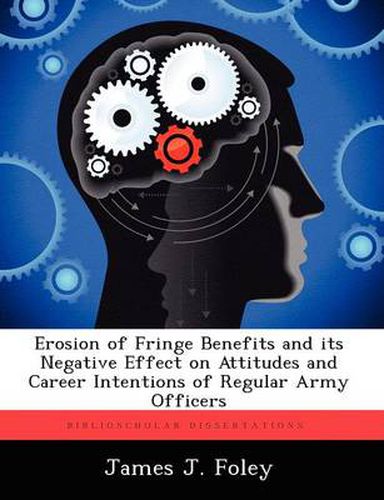Readings Newsletter
Become a Readings Member to make your shopping experience even easier.
Sign in or sign up for free!
You’re not far away from qualifying for FREE standard shipping within Australia
You’ve qualified for FREE standard shipping within Australia
The cart is loading…






This title is printed to order. This book may have been self-published. If so, we cannot guarantee the quality of the content. In the main most books will have gone through the editing process however some may not. We therefore suggest that you be aware of this before ordering this book. If in doubt check either the author or publisher’s details as we are unable to accept any returns unless they are faulty. Please contact us if you have any questions.
Many soldiers feel that their fringe benefits are being gradually but steadily worn away. The benefits themselves exert a significant influence on an individual’s decision to make the Army a career. This study, aimed at Regular Army officer students at the Command and General Staff College, attempts to determine the effect of the perceived erosion of benefits on career planning decisions and on officers’ attitudes concerning the Army. The investigation focused on the deterioration of the fringe benefit package as a whole, medical care benefits, retirement benefits, commissary store privileges, and the unwritten contract. Twenty-four other factors affecting retention were examined briefly to put the erosion of benefits in proper perspective. The research reveals that the disintegration of the whole fringe benefit package, and particularly medical care and retirement benefits, are strong influences to leave the Army. The deterioration of the commissary store privilege is also an influence to leave, albeit weaker, while the unwritten contract is still a relatively weak incentive to stay. The perceived erosion of benefits is contributing to reduced career aspirations. Those officers who are strongly influenced by these issues are older, have served longer, are unhappier about the fringe benefit situation, are less inclined to encourage junior officers to pursue an Army career, and have decided to retire with between 20 and 25 years of service. Having selected a retirement date, they are less sensitive to the whole issue than their contemporaries with indefinite or unlimited career aspirations who will stay longer if the benefits stabilize and leave sooner if the decay continues.
$9.00 standard shipping within Australia
FREE standard shipping within Australia for orders over $100.00
Express & International shipping calculated at checkout
Stock availability can be subject to change without notice. We recommend calling the shop or contacting our online team to check availability of low stock items. Please see our Shopping Online page for more details.
This title is printed to order. This book may have been self-published. If so, we cannot guarantee the quality of the content. In the main most books will have gone through the editing process however some may not. We therefore suggest that you be aware of this before ordering this book. If in doubt check either the author or publisher’s details as we are unable to accept any returns unless they are faulty. Please contact us if you have any questions.
Many soldiers feel that their fringe benefits are being gradually but steadily worn away. The benefits themselves exert a significant influence on an individual’s decision to make the Army a career. This study, aimed at Regular Army officer students at the Command and General Staff College, attempts to determine the effect of the perceived erosion of benefits on career planning decisions and on officers’ attitudes concerning the Army. The investigation focused on the deterioration of the fringe benefit package as a whole, medical care benefits, retirement benefits, commissary store privileges, and the unwritten contract. Twenty-four other factors affecting retention were examined briefly to put the erosion of benefits in proper perspective. The research reveals that the disintegration of the whole fringe benefit package, and particularly medical care and retirement benefits, are strong influences to leave the Army. The deterioration of the commissary store privilege is also an influence to leave, albeit weaker, while the unwritten contract is still a relatively weak incentive to stay. The perceived erosion of benefits is contributing to reduced career aspirations. Those officers who are strongly influenced by these issues are older, have served longer, are unhappier about the fringe benefit situation, are less inclined to encourage junior officers to pursue an Army career, and have decided to retire with between 20 and 25 years of service. Having selected a retirement date, they are less sensitive to the whole issue than their contemporaries with indefinite or unlimited career aspirations who will stay longer if the benefits stabilize and leave sooner if the decay continues.